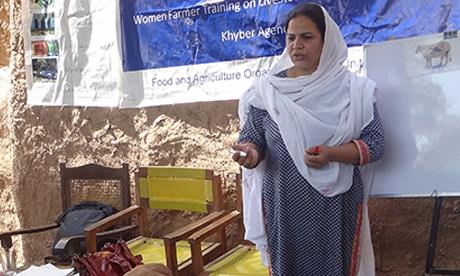Rebuilding farming livelihoods for the men and women of Pakistan’s FATA
Gul Baro Bibi looks at her vegetable produce with relief. Her face glows with a sense of achievement as she watches her okra and bottle gourd ready to be harvested.

The vegetables might appear ordinary to anyone else, but for Gul Baro Bibi, her small field is special because it tells her story.
Pakistan’s Federally Administered Tribal Areas (FATA) has been severely affected by unrest and military operations over the last decade. Some 260 000 families, including Gul Baro Bibi's, were displaced from their homes. Leaving meant safety for these families, but it also meant losing their homes, poultry, livestock and standing crops, assets that are the lifeline of these communities.
In 2015, when many families were able to return to Bara, they faced the daunting prospect of restarting their livelihoods. In response, FAO and the Japan International Cooperation Agency (JICA) launched the "Recovery and Development of the Agricultural Economy in FATA" project in July 2015.
The project has been especially important for women like Gul Baro Bibi. Through the project, FAO has trained more than 400 women farmers, and 15 Women Open Schools (WOS), led by female facilitators, are providing capacity building training to women throughout the various villages of Bara.
Through the training sessions, the women gained the skills and knowledge required for growing vegetables and ensuring healthy harvests. They also learned about the benefits of improving nutrition through vegetable production and home gardening.
Gul Baro Bibi talks fondly about the WOS that she was able to attend. “I was unaware of proper agricultural techniques to grow vegetables. Growing on a small plot I learnt is easy and interesting,” she says, as she looks happily at her vegetable plot.
“Through WOS I am now able to grow and sell vegetables more efficiently. Throughout the season, my family and I consume fresh, chemical-free vegetables.”
